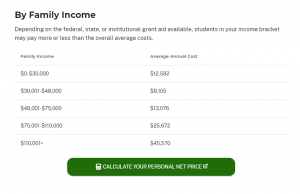Student-centric advice and objective recommendations
Higher education has never been more confusing or expensive. Our goal is to help you navigate the very big decisions related to higher ed with objective information and expert advice. Each piece of content on the site is original, based on extensive research, and reviewed by multiple editors, including a subject matter expert. This ensures that all of our content is up-to-date, useful, accurate, and thorough.
Our reviews and recommendations are based on extensive research, testing, and feedback. We may receive commission from links on our website, but that doesn’t affect our editors’ opinions. Our marketing partners don’t review, approve or endorse our editorial content. It’s accurate to the best of our knowledge when posted. You can find a complete list of our partners here.
How to Use the College Scorecard
 By
Will Geiger
By
Will Geiger 
Will Geiger is the co-founder of Scholarships360 and has a decade of experience in college admissions and financial aid. He is a former Senior Assistant Director of Admissions at Kenyon College where he personally reviewed 10,000 admissions applications and essays. Will also managed the Kenyon College merit scholarship program and served on the financial aid appeals committee. He has also worked as an Associate Director of College Counseling at a high school in New Haven, Connecticut. Will earned his master’s in education from the University of Pennsylvania and received his undergraduate degree in history from Wake Forest University.
Full BioLearn about our editorial policies

Caitlyn Cole is a college access professional with a decade of experience in non-profit program and project management for college readiness and access organizations.
Full BioLearn about our editorial policies

Maria Geiger is Director of Content at Scholarships360. She is a former online educational technology instructor and adjunct writing instructor. In addition to education reform, Maria’s interests include viewpoint diversity, blended/flipped learning, digital communication, and integrating media/web tools into the curriculum to better facilitate student engagement. Maria earned both a B.A. and an M.A. in English Literature from Monmouth University, an M. Ed. in Education from Monmouth University, and a Virtual Online Teaching Certificate (VOLT) from the University of Pennsylvania.
Full BioLearn about our editorial policies

The College Scorecard is one of the most powerful tools for students and parents in the admissions and financial aid processes. The College Scorecard was launched by the federal government in 2015 as a way to provide reliable data about college cost, starting salary for graduates, and student debt.
For students, the College Scorecard is a useful research tool to understand what a college costs and how much money you can expect to earn after graduation or degree attainment.
Related: How to choose a college
Using the College Scorecard
The College Scorecard is a comparison tool that allows students and parents to compare colleges by a number of factors.
For our purposes the most important factors are the Average Annual Cost (or Net Cost), the Graduation Rate, and the Salary After Attending. These factors will help you determine your college ROI (Return on Investment) by answering these three questions:
- Will the college be affordable?
- Am I likely to graduate?
- What type of salary am I likely to be making upon graduation?
This is useful information both for both selecting colleges that you may apply to and for making a financial decision. Now, let’s dive into these three big questions that you can answer with the College Scorecard:
Will the college be affordable?
The College Scorecard has a number of important data points focused on college affordability. Specifically, the Average Annual Cost is useful to look at because it will give you a sense of whether a college offers generous financial aid.
If you click on the “Cost” tab for a given school, you’ll find a chart that looks like this, which breaks down average annual price at the college by family income bracket. So, using this information, you can get an idea of what the school might end up charging you per year.

The Scorecard also provides information about the average student loan burden over four years. This will give you a sense of how much money students must pay back in student loans.
Note that the most accurate college cost estimate will be through the Net Price Calculator.
Am I likely to graduate?
Graduation rate (or the percentage of students who graduate within six years of starting college) is important to consider, because the value of college is based on actually earning a degree. As a benchmark, the average six year graduation rate is 60% according to the National Center of Education Statistics.
What type of salary am I likely to be making upon graduation?
One of the best stats you can discover through the College Scorecard is average salary after graduation. This can be really helpful for determining whether your student loan burden is appropriate. The College Scorecard even allows students to view salaries according to specific major which adds additional context.
For more context: What is the average starting salary out of college?
College Scorecard vs college rankings
You’ll notice that College Scorecard shares a few common elements with college ranking lists like the US News or Princeton Review. However, there are a few key differences that you should be sure to notice. In a February 2022 statement, the Department of Education released a statement clarifying the Scorecard’s mission. They wrote that they aim to prioritize “affordability, inclusivity, and outcomes, over exclusivity.”
So, while sites like US News and Princeton Review tend to factor exclusivity, such as admission rate and average admitted test scores, into their rankings, the College Scorecard does not. Its system is more focused on student outcomes than prestige or exclusivity. You’ll get an idea of projected future earnings, graduation rate, and average financial aid. In this sense, it can be a more useful tool for students; you’ll get a better idea of your return on investment at the school you’re considering.
Also see: Do college rankings matter?
Bottom line for students
The College Scorecard should be an essential tool in every student’s research toolkit. Used alongside other key college research tools like campus visits, talking to staff and faculty, and interviewing current students, the College Scorecard can help give you a well-rounded look at the college or university that is the best fit for you! To get started, you can search the College Scorecard by a specific college or university.
If the tool seems overwhelming to you at first, don’t worry! You’re not alone – the College Scorecard puts a lot of useful information at your fingertips, which can be helpful, but also hard to utilize. If you are confused about any of the information, don’t hesitate to reach out to your school’s college counselor or another college admissions professional.
What to do next
Once you’ve used the College Scorecard to decide on a college, it’s time to start hunting for scholarships! For the vast majority of students, college is a huge financial burden. And don’t forget to apply to a wide range of colleges within your preferences. It’s a good idea to apply to a spread of reach schools as well as financial safety schools, such as an in-state public institution. Be sure to lighten the financial burden of college costs by applying to all the scholarships you qualify for!



